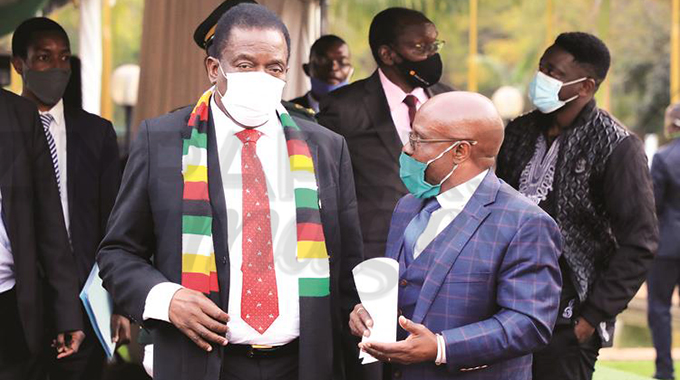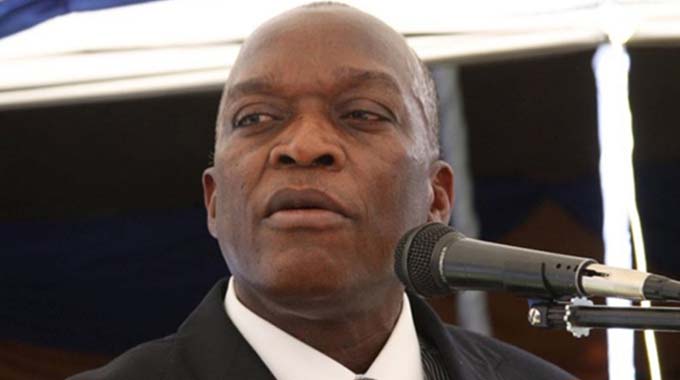Clampdown on corruption to continue — President

Herald Reporter
PRESIDENT Mnangagwa has said his Government will continue investigating and clamping down on corruption as it continues to pursue goals towards achieving Vision 2030 and removing impediments towards realisation of those objectives.
Speaking at the third principals’ executive plenary meeting of Political Actors Dialogue (Polad) at State House in Harare yesterday, President Mnangagwa announced that the National Development Strategy 1 will succeed the Transitional Stabilisation Programme and called for input from all sectors.
He however, said his Government which has been lauded for its anti-corruption stance, will continue arresting corrupt officials.
This comes as former Health and Child Care Minister Obadiah Moyo was relieved of his duties after being implicated in a scandal involving the procurement of drugs and other sundries that were required in the fight against the Covid-19 pandemic.
“We continue to investigate corrupt activities and take swift action whenever such cases arise. This global health emergence has revealed weaknesses relating to our health systems initial inability to handle the emergency due to inadequate equipment and medical supplies However, Government has since directed most of its funding to fight the scourge” he said.
The President invited Polad members to support the Government in coming with the National Development Strategy 1, which is anchored on 14 clusters and would go a long way in ensuring Zimbabwe realises its Vision 2030, to be a middle class economy.
The 14 identified national clusters are namely; the economic growth stability, food security and nutrition; transport, infrastructure and utilities; Governance; moving the economy up the value chain and structural transformation; housing delivery; health and wellbeing; human capital development; environment protection; climate resilience and natural resources management; image building and international engagement; devolution; social protection; digital economy; and youth and culture.
The President said presently consultations at national level with all stakeholders are underway and should be concluded soon.
“The process will culminate in the production of the National Development Strategy, which guides the 2021 National Budget. As such let me invite you colleagues to input into the formulation of the National Development Strategy such that no one is left behind. Your invaluable contribution to this policy formulation process is most appreciated,” said President Mnangagwa.
He challenged Polad members to contribute towards the policy formulation process to in order make Zimbabwe great.
He further said the Government remains committed to the devolution process as shown by the allocation and distribution of the financial resources under the 2020 Budget.
He said that the funds that have been allocated to local authorities are being directed towards Covid-19 related facilities such as water and sanitation, isolation, quarantine, and treatment centres.
“The full devolution process will come into effect once the Constitutional Amendment No 2 Bill is passed in Parliament”.
Some of the objectives of the devolution policy are to facilitate democratic participation of people in decision making, promotion of good governance, maintenance of Zimbabwe as a peaceful State as well as the provision of a resource sharing mechanism.
Above all, he said the devolution programme emphasises the growth of local economies and economic empowerment of communities by delegating economic decision making to local administrative structures and communities.
“Thus locally generated resources will be used to develop local economies, with provincial economies having disaggregated Growth Domestic Product GDPs,” he said.
He informed Polad members about the challenges experienced in the economy such as rising inflation and foreign currency exchange rate and interventions that have been taken by Government to ameliorate the situation.
“Government noted that the negative spiralling was not in any way related to economic fundamentals. Government undertook investigations and noted the emergency of a shadow banking system linked to the abuse of the mobile money transfer system and trading on the Zimbabwe Stock Exchange.
“The Reserve Bank of Zimbabwe has since suspended trading on the Zimbabwe Stock Exchange, and Agent and Bulk Payer transactions on the mobile money transfer platform. A special forensic audit has since been commissioned to get to the bottom of the rot. You will be kept abreast of any outcomes in that regard,” said President Mnangagwa.
Furthermore, he said the introduction of the foreign currency auction system by the RBZ is meant to bring about economic and financial stability, and help to build market confidence as well as improve access to foreign currency through a transparent and efficient system.
The auction system, he said should restore discipline in the financial sector and thereby curtail speculative activity in the parallel market
He also updated the political principles on Government’s position and measures put in place towards the fight against Covid-19.
“As you are no doubt aware, the Covid-19 outbreak has been with us for some time and indications are that it will be with us for some time to come. The global health pandemic which has negatively impacted the whole world has seen many countries taking action to protect their citizens. On our part as Zimbabwe, we have implemented lockdown measures to prevent the spread of the disease with the increasing number of cases attributable to our returning citizens mainly from South Africa,” he added.
In the past week, he said there has been a spike in the numbers and the numbers of local transmissions have also increased.
As such the President said more tests are being carried out and the World Health Organisation guidelines are being adopted with regard to the discharge of patients from quarantine centres.
“Law enforcement agents have increased their vigilance with regard to patrolling designated crossing points, enhancing security measures at quarantine centres to deter people from escaping, and reporting any members that return to communities without clearance from authorities at quarantine centres,”.
He said that the stern measures are necessary to safeguard the lives of people and some valuable lessons have been drawn from some countries such as Germany, Australia and others within Africa that quickly lifted lockdown measures and were subsequently forced to reconsider.










Comments